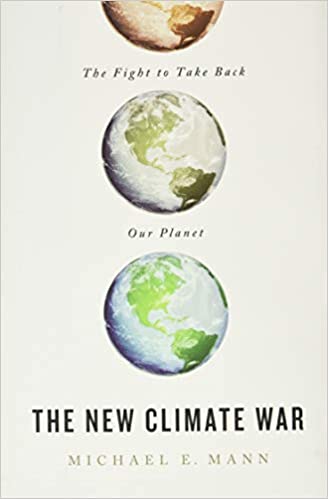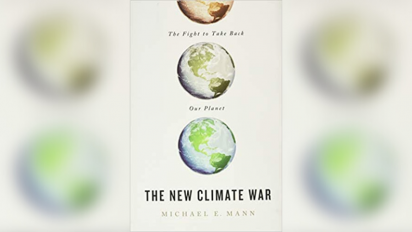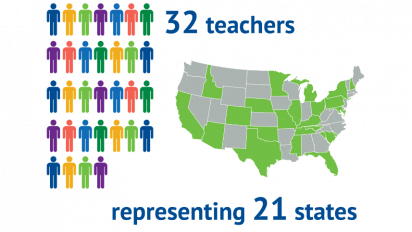The New Climate War: The Fight to Take Back Our Planet
Michael E. Mann's latest book "alerts the public to the tactics and stakes of this new climate war, and arms readers with the weapons to fight it," our reviewer writes.
On September 22, 2017, two days after Hurricane Maria made landfall in Puerto Rico, The Takeaway, a National Public Radio show where I was working at the time, interviewed Bjørn Lomborg, president of the innocuous-sounding Copenhagen Consensus Center. The topic was climate change, and Lomborg, in New York to speak at the United Nations General Assembly, seemed like the ideal guest. He was presented as a climate economist who could discuss level-headed, novel solutions in the hurricane’s wake, and who was actively engaged in international policy. The issue was not carbon emissions, according to Lomborg, but rather “resiliency.” “The honest answer,” Lomborg told the show’s audience of three million, “is that if you want to help these people, it’s much more about building resilient structures.”
 Unbeknown to the producers and to the audience, the fossil fuel industry had been funding Lomborg’s work for years, helping to mainstream a notion that climate change is better fought by “adaptation” instead of cutting carbon. The episode is a classic example of climate “inactivism” that climate scientist Michael Mann exposes in his new book, The New Climate War. According to Mann, the fossil fuel industry has recognized the untenability of outright denialism, and has shifted to a more subtle politics of inaction in recent years. The landscape of this “new climate war,” as Mann terms it, is varied and complex: from the “adaptation” of Bjørn Lomborg, to pitting different factions of the climate movement against one another, to deflecting attention away from corporations and onto individuals in the form of personal carbon footprint calculators. While the public is still looking for outright denialism, this multi-pronged offensive of the “new climate war” is where the real action is, language that Mann acknowledges might be uncomfortable for some, but signifies the high stakes of the fight: “[T]he surest way to lose a war is to refuse to recognize you’re in one in the first place” (p. 7).
Unbeknown to the producers and to the audience, the fossil fuel industry had been funding Lomborg’s work for years, helping to mainstream a notion that climate change is better fought by “adaptation” instead of cutting carbon. The episode is a classic example of climate “inactivism” that climate scientist Michael Mann exposes in his new book, The New Climate War. According to Mann, the fossil fuel industry has recognized the untenability of outright denialism, and has shifted to a more subtle politics of inaction in recent years. The landscape of this “new climate war,” as Mann terms it, is varied and complex: from the “adaptation” of Bjørn Lomborg, to pitting different factions of the climate movement against one another, to deflecting attention away from corporations and onto individuals in the form of personal carbon footprint calculators. While the public is still looking for outright denialism, this multi-pronged offensive of the “new climate war” is where the real action is, language that Mann acknowledges might be uncomfortable for some, but signifies the high stakes of the fight: “[T]he surest way to lose a war is to refuse to recognize you’re in one in the first place” (p. 7).
Mann’s book, aimed at everyone from young students to longtime activists, alerts the public to the tactics and stakes of this new climate war, and arms readers with the weapons to fight it. Over nine chapters divided largely by the development of different tactics, Mann begins by tracing the history of corporate denialist and deflection campaigns back to the early twentieth century. He then turns to more recent histories of industry-funded environmental campaigns, explaining how he found himself on the frontlines of the new climate war following the publication of his “hockey stick graph” of carbon emissions in 1998. The book is as much a landscape of the current climate fight as it is a history. While Mann is often too eager to suggest that anti-capitalist progressives are fueled by Russian disinformation campaigns, his analysis is at its best when grounded in discussions of climate science, providing clear explanations of why technological solutions like “clean coal” are doomed to fail, why scenarios of “runaway climate change” are often overblown, and what the latest climate science really tells us about the years ahead.
Indeed, readers might be surprised to find just how optimistic Mann is in his outlook. While doomsday scenarios abound in the broader public discourse, The New Climate War seeks to motivate, rather than depress, the public to push for political change, suggesting that we might be on the precipice of a turning point in the climate fight. Not only have carbon emissions leveled off in recent years, the result of advances in renewable energy, but Mann also sees an opening in the U.S. political horizon, with an uptick in extreme weather, the coronavirus pandemic, and a new wave of youth activism together creating a “perfect storm” for climate policy. Above all, Mann stresses the need for both urgency and agency in the climate fight, arguing that it’s not too late to meaningfully address climate change if we act collectively and work for systemic change.
While Mann largely leaves it to the reader to decide how to best advocate for climate policy — a missed opportunity that could have made the book a particularly useful tool of climate organizing — Mann’s restoration of individual agency, coupled with highly approachable explanations of climate science, makes the book invaluable for science educators and students alike looking to be involved in the fight against climate change. Readers will come away from The New Climate War with a clear understanding of the climate landscape, and a sense that, in a turbulent political environment, the fight against climate change and the fossil fuel industry is one that we can, and must, win.
This version might differ slightly from the print publication.







